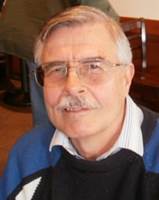Feb. 1, 2015
Member Spotlight: John
Bluck
By Lani
Longshore
 John Bluck has a communications degree and experience as a
journalist, cameraman and documentary maker. His entire career has been about
stories. So what's it like being a novelist? "Fiction is hard. I'm more
attuned to presenting facts."
John Bluck has a communications degree and experience as a
journalist, cameraman and documentary maker. His entire career has been about
stories. So what's it like being a novelist? "Fiction is hard. I'm more
attuned to presenting facts."
The facts about John's career are worthy of a novel. Drafted during the Vietnam
War, he became an Army journalist. He covered Watergate and its aftermath as a
cameraman for ABC affiliate WMAL-TV (John was part of the camera pool that
filmed Nixon's letter of resignation being delivered). After working at ABC
network radio station WMAL-AM as an engineer playing records and making
commercials, NASA hired him following a job interview in a Washington, D.C.
tavern.
He worked at NASA's Lewis Research Center (now Glenn) in Cleveland. He produced
weekly half-hour TV shows aired by 50-60 PBS stations, some during prime time,
others for daytime educational time slots. Several of his 13-week series were
translated into many languages by the United States Information Agency (USIA)
and broadcast worldwide. John transferred to NASA Ames Research Center in
Mountain View, CA, where he ran the imaging technology branch. Then he became a
NASA public affairs officer.
John retired in 2008 but continued writing. He had stories to tell and the
confidence to put the words on paper. "I knew how to write scripts, and
since I was a cameraman I had a good sense of images." His time in radio
also helped him create a world on paper. "Your imagination is so powerful,
but it needs to be triggered."
John said he methodically plotted his first novel, The Ship Finder, a
science fiction adventure. "I'm more of a formula writer, because that's
what you do with press releases." He self-published The Ship Finder but
plans to look for an agent and a traditional publisher for the sequel.
Mysteries also appeal to John, both as an exercise in a different writing
formula and because he covered crime as a cameraman. If he ever finds extra
time, he will write a memoir about his experiences at NASA.
John shared the writing advice that works for him: "I like to get a good
structure down first, then fine tune - or do major surgery - later." He
uses his experience creating documentaries when he edits. "Everything
always points back to the theme. You have to have a clear vision."
--end--
This article
was first published in Write Around The Valley, the newsletter of the California
Writers Club Tri-Valley Branch and is used with the permission of the club
and Lani Longshore.
Photo
of John Bluck is by Lani
Longshore, and is used here with her permission.